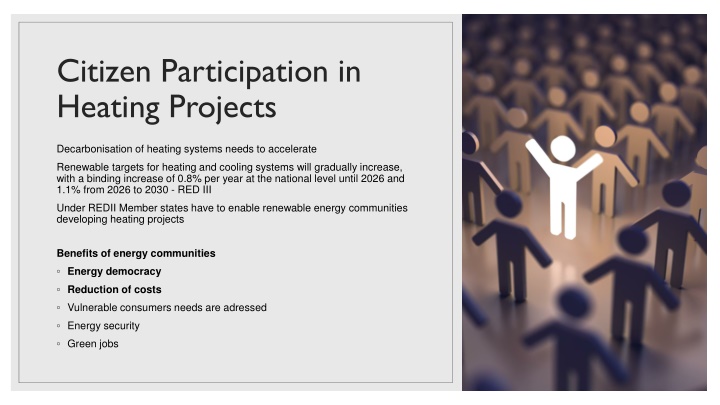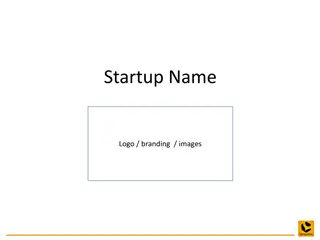
Accelerating Citizen Participation in Heating Projects for Energy Transition
Decarbonisation of heating systems requires increased citizen participation. Renewable targets for heating and cooling systems are set to rise annually, with a focus on energy communities in Germany and Poland. Challenges and policy recommendations are outlined to support Heating Energy Communities in contributing to the energy transition.
Download Presentation

Please find below an Image/Link to download the presentation.
The content on the website is provided AS IS for your information and personal use only. It may not be sold, licensed, or shared on other websites without obtaining consent from the author. If you encounter any issues during the download, it is possible that the publisher has removed the file from their server.
You are allowed to download the files provided on this website for personal or commercial use, subject to the condition that they are used lawfully. All files are the property of their respective owners.
The content on the website is provided AS IS for your information and personal use only. It may not be sold, licensed, or shared on other websites without obtaining consent from the author.
E N D
Presentation Transcript
Citizen Participation in Heating Projects Decarbonisation of heating systems needs to accelerate Renewable targets for heating and cooling systems will gradually increase, with a binding increase of 0.8% per year at the national level until 2026 and 1.1% from 2026 to 2030 - RED III Under REDII Member states have to enable renewable energy communities developing heating projects Benefits of energy communities Energy democracy Reduction of costs Vulnerable consumers needs are adressed Energy security Green jobs
Heating Energy Communities in Germany Energy communities in Germany engage primarily in electricity energy production (electricity (photovoltaics, wind) and heat (biomass)). Most popular legal form for energy communities:cooperative. Challenges: The regulatory framework and the bureaucracy Lack of RED II transposition Initial investments costs Reliance on voluntary work; lack of professional experience Lack of support of local politicians Energy market dynamics
Heating Energy Communities in Poland None of the 33 registered energy cooperatives conducts heating projects. Energy clusters focuse mostly on electricity Challenges: Lack of support system for heating energy communities Lack of cooperation with municipalities and DSOs Financial costs Lack of professional knowledge Lack of attractive public funding and mentoring programme
Conclusions and Policy Recommendations Conclusions HECs can significantly contribute to the energy transition. Heating projects demands subsidies Support from local politicians and professionals is crucial for the success of HECs. Policy Recommendations Local policymakers should adopt a collaborative approach, including HECs in their heat planning and projects. Creation of clear legal framework (with energy efficiency first principle) and transposition of RED II Provide financial support to reduce the high investment costs associated with HECs. Create a special national agency/ programme which would facilitate Capacity Building and Professional Support among energy communities.






















